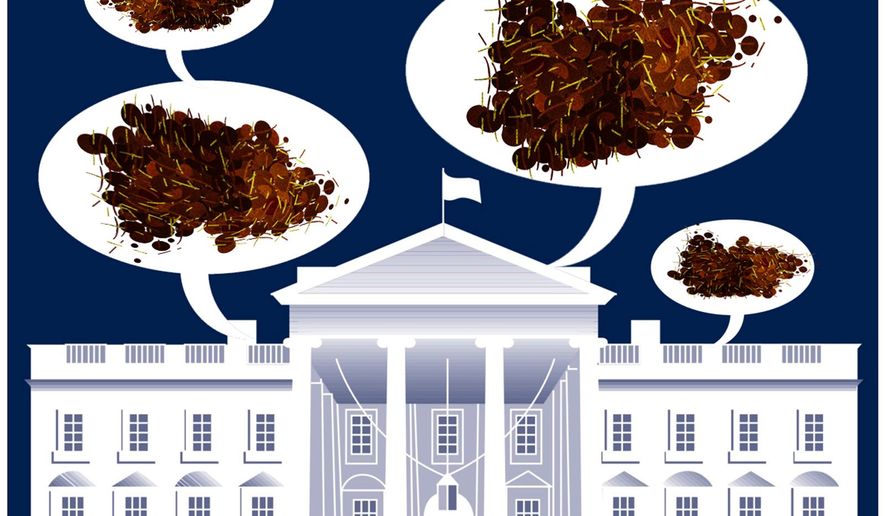OPINION:
It was 1974. Richard Nixon was in the White House fighting for his political life and James L. Buckley, who had been elected to the Senate on the Conservative Party line in New York four years before was privately wondering whether he could in good conscience continue to support a president who he believed had betrayed his principles, the presidency and the nation. As the Watergate revelations built, Democrats were demanding the president’s head, but most Republicans were still nervously defending their president.
I was at the time on Sen. Buckley’s staff after having served in the Nixon White House as an assistant to his vice president, Spiro Agnew, until Mr. Agnew resigned. I knew enough to suspect that my new boss’ concerns were legitimate and participated in several meetings with him and some of his closest friends to discuss his stance. I kept arguing that while I believed his concerns were legitimate and that the president was probably as involved in the cover-up of the Watergate burglary as his critics believed, there was no public evidence to justify a withdrawal of support.
I reminded the senator that he was elected by the very voters who made up what in those days was called the “silent majority” and that to his base support, political loyalty was very important. He could not politically afford to abandon a president based on his feelings rather than real evidence.
By the early spring, I felt there was enough out there to allow him to withdraw his support for Mr. Nixon without looking either panicky or foolish in the eyes of his supporters and I said so at our next meeting on the subject. On March 19, Mr. Buckley told reporters gathered in the Senate Caucus Room that he believed Richard Nixon owed it to the country to resign as president. The only other “Republican” senator to have abandoned Mr. Nixon at that point was Ed Brooke of Massachusetts. Mr. Buckley’s act was universally seen as more important because he was the first conservative to jump ship.
The political consequences of what he did soon became apparent. The working class conservatives who made up his New York base were outraged, but when the Nixon tapes came out, he became something of a hero not so much in New York, but in the Midwest. New Yorkers may have been more familiar with and willing to excuse the president’s language, but his profanity outraged the more buttoned down Midwesterners, many of whom seemed more upset with his language than the substance of what he was taped saying.
The same distress was felt by the religious voters of the South who had voted for him. The Rev. Billy Graham, considered a close Nixon confidant, told Bob Haldeman, the White House chief of staff, that he was “absolutely crushed” by the way the president of the United States talked in the Oval Office. He and others viewed the language itself as an affront to the office.
This isn’t 1974. We know today that presidents are human; we’ve witnessed Mr. Nixon’s successors do far worse than use profanity in the Oval Office and our culture today is more accepting of what would have been considered totally beyond the pale back then. But President Trump and his people should realize that millions of Americans are offended when language they may themselves may use in private is publicly uttered by public officials who they believe should be held to a higher standard.
This explains the outrage at Mr. Trump’s comments at the Boy Scout Jamboree recently and at the stunned silence from many of his supporters when they heard and read of his new communications director’s profanity-laced diatribe against those on the White House staff he would like to fire.
In 1974, the “expletive deleted” from the released transcripts of Mr. Nixon’s conversations were incredibly mild when compared with what Anthony Scaramucci had to say about White House Chief of Staff Reince Priebus and Trump adviser Steve Bannon. In 1974 no responsible publication would have printed them and even Mr. Nixon would have fired the man on the spot. But that, of course, was then.
Mr. Trump’s electoral majority last year was the result of support from the very same voter groups in the Midwest and South that elected Richard Nixon and stuck with him until they decided by the millions that he was culturally and morally unacceptable. They cast their votes as they did because of the cultural values they sought to maintain and deserted the man thus elected because they were convinced by his words as much as his deeds that he didn’t share them.
By insisting that Mr. Scaramucci be removed as communications director after so short a time, Mr. Trump’s new chief of staff did the president a real favor. The president should be careful. Surrounding oneself with the likes of Mr. Scaramucci is more dangerous than he might realize.
• David A. Keene is editor at large at The Washington Times.




Please read our comment policy before commenting.